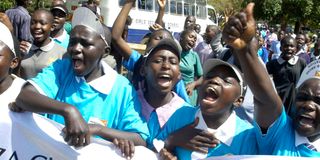Kenya must tackle child sexual exploitation and abuse head on

In this file photo, children from a section of primary schools protest against child abuse and exploitation during Nyanza Provincial Children Voices Forum in Kisumu.
Two weeks ago, a Narok court jailed a man for life for defiling a nine-year-old girl - a few months after a new Global Index ranked Kenya fifth on its commitment to prevent and respond to child sexual abuse and exploitation.
The Out of the Shadows Index assessed 60 countries in two categories - prevention and response.
The prevention category comprised three pillars namely their protective legislation, policies and programmes, and national capacity and commitment to preventing child sexual abuse and exploitation.
The response category comprised two pillars namely their justice processes, and support services and recovery that respond to cases of child sexual exploitation and abuse.
Overall, Kenya was ranked 22nd on prevention of child sexual exploitation and abuse, and 21st on its response to it.
The assessment found gaps in Kenya’s support systems, recovery, and judiciary processes – starkly illustrated by the Narok case, where the nine-year-old minor, who had to undergo a caeserian section and a stillbirth, was committed to a children’s home.
While the judgment was appropriate, a responsive support system for the girl would involve giving comprehensive psychosocial support for recovery in an appropriate institution such as a safe house that offers services tailored for girls who have undergone traumatic experiences as a result of Female Genital Mutilation (FGM) or early child marriage.
Court cases are only the tip of the iceberg. Out of the Shadows Index notes that every year, over 400 million children worldwide are exposed to sexual exploitation and abuse.
Data on child sexual abuse and exploitation can provide essential insights into the widespread problem, and thus inform national laws, policies, plans, and budgets that respond to it.
Although Kenya scores favorably on data collection on the prevalence of child sexual exploitation and abuse, the information has not been fed into a single national database, and many cases remain unreported.
Courts, therefore, provide a window for the country to view the most egregious cases and are important platforms for accessing justice as well as truth-telling and healing.
Many courts in Kenya are making efforts to create more child-friendly environments. They allow children to give evidence in camera or in a safe space. Children’s courts have also been established in some counties.
Also, the law provides that as long as a court finds a survivor credible, there is no longer a need for corroborating material evidence.
Justice system
The State is also obliged to provide medical and psychosocial services survivors of child sexual exploitation and abuse need when navigating the justice system.
Be that as it may, children’s full access to these rights and services is hampered by limited resources and coordination among government actors mandated to provide them under the law.
Moreover, abuse victims cannot always talk about their experiences immediately after the event. For some, it may take years, sometimes even decades, to give an account of the trauma they experienced.
Some countries like South Africa have understood this and have eliminated the criminal statute of limitations for child sexual exploitation and abuse cases, paving the way for more reporting of sexual violence. Kenya should seriously consider taking this route.
Punishing the perpetrator is often only part of the journey to recovery for a survivor. Aftercare for survivors is important yet generally limited and rarely addresses long-term psychological and emotional needs.
Child sexual exploitation and abuse can lead to a lifetime of physical and emotional damage for survivors.
Equality Now and Trace Kenya recommend the development of mentorship programs for survivors and their families to provide children who have been exploited or abused with a support system, and establish evidence-based peer-to-peer mentoring schemes in schools and communities.
There is a great deal that the justice system can do to accommodate the needs of survivors. Beyond the delivery of justice, survivors need to be connected to support networks that provide long-term, holistic support for everyone.
A support system based on mentorship programmes for survivors and their families and peer-to-peer mentoring schemes in schools and communities can buttress this support.
Kenya’s excellent laws and policies need to be put to work. Often, survivors, their families, and first responders do not understand the legal and administrative processes for redress.
These laws and policies have also not been communicated adequately to the public. There can never be too much awareness – primarily because of newly adopted laws and policies, such as the Children Act, 2022, and the National Plan of Action to Tackle Online Child Sexual Exploitation and Abuse (2022-2026).
Those who identify, investigate and prosecute child sexual exploitation, and abuse cases require tailored, trauma-informed training, as well as the legal, health, and administrative workers who process survivors.
Inadequate funding and low staff numbers continue to hamper the provision of services such as medical care, shelter, and psychosocial support for survivors.
Pooling resources from the government and other actors can accelerate the implementation of recently adopted laws and policies on child protection.
Further, the government can directly fund institutions legally mandated to protect children, such as the Child Welfare Fund. Created under the Children Act, the fund assists children in distress and need, including funding alternative care and social security programs that safeguard children’s rights.
The writer is a digital law rights consultant at Equality Now





